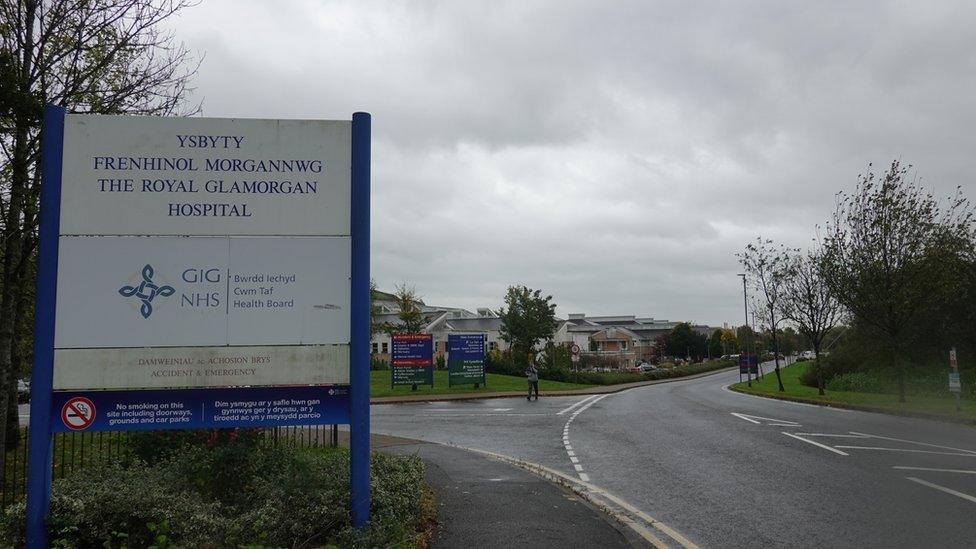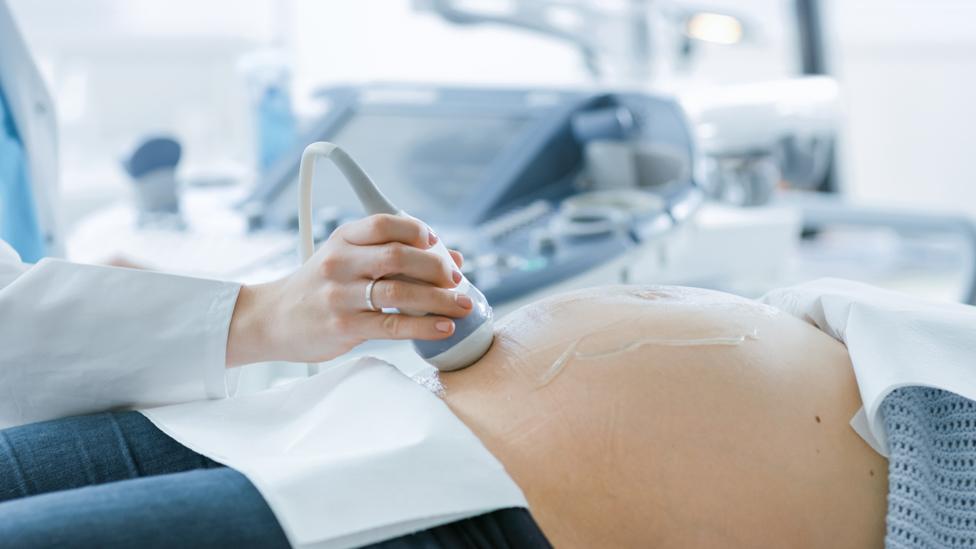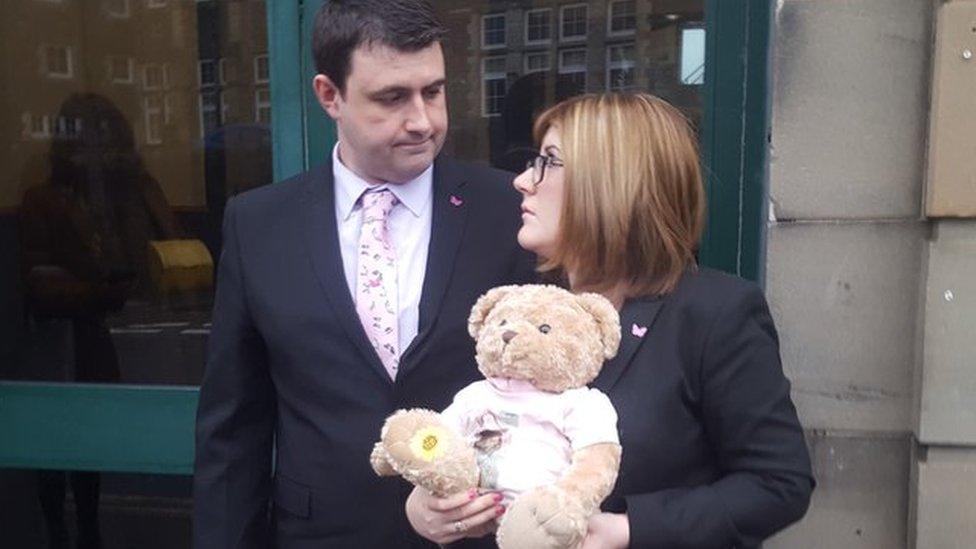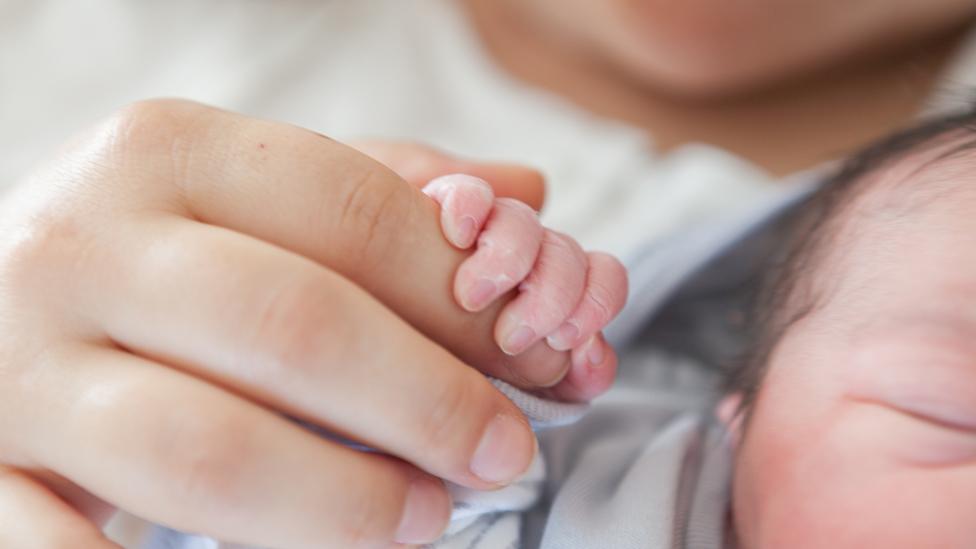Cwm Taf maternity services: 'Long way to go' until safe
- Published
Chrystie Jenkins says there was no communication or teamwork at the hospital she was treated in
There is a "very long way to go" before maternity services at a health board can be declared safe, an independent review panel has said.
The panel was appointed after a damning review into Cwm Taf, prompted by the death of a number of babies.
It revealed it would review more than 100 extra cases, external between 2016 and 2018 where it believed lessons could be learnt, although not all were serious.
However, it said the health board was beginning to make improvements.
The review - which branded maternity services "dysfunctional" - was prompted by 25 serious incidents, including eight stillbirths and five neonatal deaths, between January 2016 and September 2018.
It uncovered failings at the Royal Glamorgan Hospital in Llantrisant, Rhondda Cynon Taff, and Prince Charles Hospital in Merthyr Tydfil.
Responding to the update, Greg Dix, director of nursing, midwifery and patient care at Cwm Taf Morgannwg health board, said he knew how important it was to learn from the past.
"The clinical review process, which has been outlined today, will identify any further action to ensure the right systems and continual improvements are in place for the future," he added.
Health Minister Vaughan Gething said there was "clearly still a considerable way to go" to address the problems.
Chrystie Jenkins, 33, who lost three babies at Prince Charles Hospital in Merthyr Tydfil, said: "It doesn't make a difference whether they change things in the trust and they've got the perfect staff that do the perfect job.
"It's never going to take away or heal any of the pain any of us are going through."
When she was about 25-27 weeks pregnant with her first baby in 2011, she was in "hideous pain" but said "nobody was listening to me".
After two weeks of phoning daily, she went into hospital to be examined and was told there was nothing to worry about.
However, when she went back several hours later because she was losing blood, she was told there was nothing they could do to save her baby boy.
On Monday she went to a meeting held by the panel in advance of the update report being published, along with other families.
"There was a lot of anger, mainly around obviously the care and the way they were treated by the staff," she said.
"But I think with the stories that came out from everyone, I think it was just pure shock in the room more than anger. Some of the stories being spoken about hadn't even been identified or investigated."
Jessica Western says she is still fighting to find out why her daughter Macie died
In April, the review led by the Royal College of Gynaecologists unearthed a catalogue of serious failings and highlighted many distressing examples of where mothers and babies had likely been harmed as a result of poor care.
Along with placing the area's maternity services into special measures, Mr Gething appointed the independent panel, chaired by the former chief constable of Gwent Police, Mick Giannasi, to oversee changes.
The panel also said:
After a slow start the health board is now beginning to make progress, but there is a significant amount of work still to be done and the pace of progress needs to be increased
There is a better understanding of the underlying causes of poor performance, but much of the work to address the problems in the department and organisation is is still in the early planning stages
There are still significant gaps in the health board's capacity to manage complaints and concerns from patient and families, which must be addressed to make progress. Specifically, the team is overburdened because of a growing number of complaints since issues came to light. That has resulted in unresolved cases awaiting investigation, with increasing response times, which has led to an "irrevocable breakdown in trust" in some cases and there must be "urgent action on this"
While there are early signs behaviours may be improving, feedback from staff and patients suggests "there remains a need to change the underlying culture and values so shockingly revealed in the Listening to Women and Families report" - the supplementary report highlighting patient testimony which was published at same time as Royal College of Gynaecologists' review

The review suggested further cases dating back to 2010 should now be looked at
The panel found eight out of 11 urgent safety recommendations made by the Royal College of Gynaecologists had been addressed, but three were still being worked on:
A review of safe midwifery staffing levels is ongoing - interim numbers have been agreed by the Welsh Government and are being monitored
Staff awareness of guidelines and protocols is much improved but the health board is "not fully assured" they are routinely being applied by all staff
The panel said it was unrealistic to expect longstanding issues related to culture, attitudes and behaviours to be addressed within a few months and there was still a long way to go, but surveys of women's experiences were showing improvements in satisfaction levels
The health board originally looked at 43 potentially serious incidents between 2016 and 2018 as part of its own internal review after concerns about standards of care first emerged.
After taking over responsibility, the independent panel said about 150 cases during this period would be looked at to establish what lessons can be learnt, although it stressed these cases were not all serious incidents.
All women and families will be given opportunity to contribute.
The panel is yet to decide how many more cases on top of these it might need to look at as part of a review - stretching as far back as 2010.
In conclusion, the panel said there were "encouraging signs of progress" but it was "too early to provide the assurance which the minister and the women and families of the former Cwm Taf need in order to be confident that all necessary improvements have been achieved to ensure safe, effective, patient-centred, responsive, well managed and well-led services".
In a frequently asked questions, external document, the panel said it would not estimate the timescale for the review because of the need to be thorough, but understood the anxiety for families and expectant mothers and advised any concerned pregnant women to speak to their community midwife.
It added: "We hope that the health board will be able to provide you with the right support. However, if your concerns remain, the minister has ensured that alternative arrangements can be made should you feel that you do not wish to use the services in Cwm Taf Morgannwg."
Mr Gething acknowledged the problems still facing the health board, but said it was reassuring the panel's engagement work with women, families and staff continued "to move at pace".
"I am encouraged by the way in which they have accepted the need to make sustainable, organisational wide change which puts quality, safety and patient experience at the heart of all that they do," he added.

If would like to get in touch about this story, please email: news.focus.team@bbc.co.uk
If you have been affected by stillbirth, the following organisations might be able to help:
Sands - Stillbirth and neonatal death charity, external
Saying Goodbye - support for miscarriage and baby and infant loss, external
- Published30 April 2019

- Published30 April 2019

- Published20 January 2020
